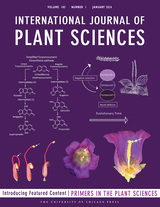4 books about Endres, David J.
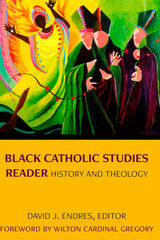
Black Catholic Studies Reader
History and Theology
David J. Endres
Catholic University of America Press, 2021
This first-ever Black Catholic Studies Reader offers an introduction to the theology and history of the Black Catholic experience from those who know it best: Black Catholic scholars, teachers, activists, and ministers. The reader offers a multi-faceted, interdisciplinary approach that illuminates what it means to be Black and Catholic in the United States.
This collection of essays from prominent scholars, both past and present, brings together contributions from theologians M. Shawn Copeland, Kim Harris, Diana Hayes, Bryan Massingale, and C. Vanessa White, and historians Cecilia Moore, Diane Batts Morrow, and Ronald Sharps, and selections from an earlier generation of thinkers and activists, including Thea Bowman, Cyprian Davis, and Clarence Rivers.
Contributions delve into the interlocking fields of history, spirituality, liturgy, and biography. Through their contributions, Black Catholic Studies scholars engage theologies of liberation and the reality of racism, the Black struggle for recognition within the Church, and the distinctiveness of African-inspired spirituality, prayer, and worship.
By considering their racial and religious identities, these select Black Catholic theologians and historians add their voices to the contemporary conversation surrounding culture, race, and religion in America, inviting engagement from students and teachers of the American experience, social commentators and advocates, and theologians and persons of faith.
[more]
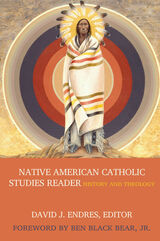
Native American Catholic Studies Reader
History and Theology
David J. Endres
Catholic University of America Press, 2022
Before there was an immigrant American Church, there was a Native American Church. The Native American Catholic Studies Reader offers an introduction to the story of how Native American Catholicism has developed over the centuries, beginning with the age of the missions and leading to inculturated, indigenous forms of religious expression. Though the Native-Christian relationship could be marked by tension, coercion, and even violence, the Christian faith took root among Native Americans and for those who accepted it and bequeathed it to future generations it became not an imposition, but a way of expressing Native identity.
From the perspective of historians and theologians, the Native American Catholic Studies Reader offers a curated collection of essays divided into three sections: education and evangelization; tradition and transition; and Native American lives. Contributors include scholars currently working in the field: Mark Clatterbuck, Damian Costello, Conor J. Donnan, Ross Enochs, Allan Greer, Mark G. Thiel, and Christopher Vecsey, as well as selections from a past generation: Gerald McKevitt, SJ, and Carl F. Starkloff, SJ.
These contributions explore the interaction of missionaries and tribal leaders, the relationship of traditional Native cosmology and religiosity to Christianity, and the role of geography and tribal consciousness in accepting and maintaining indigenous and religious identities. These readings highlight the state of the emergent field of Native-Catholic studies and suggest further avenues for research and publication.
For scholars, teachers, and students, the Native American Catholic Studies Reader explores how the faith of the American Church’s eldest members became a means of expressing and celebrating language, family, and tribe.
[more]
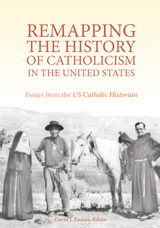
Remapping the History of Catholicism in the United States
David J. Endres
Catholic University of America Press, 2017
For more than thirty years, the U.S. Catholic Historian has mapped the diverse terrain of American Catholicism. This collection of recent essays tells the story of Catholics previously underappreciated by historians: women, African Americans, Latinos, Asian Americans, and those on the frontier and borderlands.
Timothy Matovina’s opening essay sets the theme for the volume, encouraging a remapping of U.S. Catholic history to more widely encompass its various localities and peoples, especially the significance of non-European ethnic groups and the role of Catholics in the American Southwest. Jeanne Petit explores Catholic womanhood’s strength and organizational zeal in the post-World War I era, noting the obstacles and successes of women’s attempts to be recognized fully as American citizens and members of the Church. Anne Klejment weaves together the lives of Dorothy Day and Cesar Chavez to illustrate their use of nonviolence and “weapons of the spirit” to respond to societal injustice. Amanda Bresie provides a window into the life of Mother Katharine Drexel, noting the generosity of the millionaire heiress, but also her meticulous record keeping and close supervision of her funding of educational and evangelization eorts among Native and African Americans. Kristine Ashton Gunnell analyzes the ways in which the Daughters of Charity crossed cultural boundaries to offer charitable assistance to Mexican and Japanese communities in Los Angeles. Matthew Cressler explores the intersection of Black Power and distinctive African American-inspired liturgies, arguing that the liturgy became a site of struggle as black self-determination and nationalism impacted worship and black Catholic identity. Finally, Joseph Chinnici offers an important essay on re-envisioning post-conciliar U.S. Catholicism in its global context, offering a new approach to how we consider the American Catholic narrative and write its history.
Together these path-breaking studies serve as a model for historians seeking to engage in the cartographic task of remapping the U.S. Catholic experience.
Timothy Matovina’s opening essay sets the theme for the volume, encouraging a remapping of U.S. Catholic history to more widely encompass its various localities and peoples, especially the significance of non-European ethnic groups and the role of Catholics in the American Southwest. Jeanne Petit explores Catholic womanhood’s strength and organizational zeal in the post-World War I era, noting the obstacles and successes of women’s attempts to be recognized fully as American citizens and members of the Church. Anne Klejment weaves together the lives of Dorothy Day and Cesar Chavez to illustrate their use of nonviolence and “weapons of the spirit” to respond to societal injustice. Amanda Bresie provides a window into the life of Mother Katharine Drexel, noting the generosity of the millionaire heiress, but also her meticulous record keeping and close supervision of her funding of educational and evangelization eorts among Native and African Americans. Kristine Ashton Gunnell analyzes the ways in which the Daughters of Charity crossed cultural boundaries to offer charitable assistance to Mexican and Japanese communities in Los Angeles. Matthew Cressler explores the intersection of Black Power and distinctive African American-inspired liturgies, arguing that the liturgy became a site of struggle as black self-determination and nationalism impacted worship and black Catholic identity. Finally, Joseph Chinnici offers an important essay on re-envisioning post-conciliar U.S. Catholicism in its global context, offering a new approach to how we consider the American Catholic narrative and write its history.
Together these path-breaking studies serve as a model for historians seeking to engage in the cartographic task of remapping the U.S. Catholic experience.
[more]
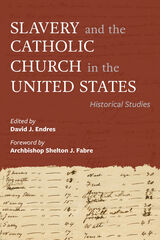
Slavery and the Catholic Church in the United States
Historical Studies
David J. Endres
Catholic University of America Press, 2023
The intertwining of U.S. Catholicism and race-based slavery is a painful aspect of the Church’s history. Many scholars have shied away from this uncomfortable topic, but in recent years a cadre of historians have studied Catholics’ varied roles: as enslaved persons, slaveholders, defenders of slavery, and, in a few cases, advocates of abolition and emancipation.
This collection of nine essays is divided into three sections: enslaved persons and slaveholders, debating abolition and emancipation, and historians and historiography. The studies, many of which are informed by recent archival discoveries, offer a model for historians seeking to understand the relationship between slavery and the Church, not only topically but in terms of methods, contexts, and resources. They contribute to a broader appreciation of religion’s role in race-based slavery and, in doing so, will assist scholars, teachers, and students in the contemporary discussion involving slavery, racism, and their legacies.
Slavery and the Catholic Church in the United States witnesses to the fragility of humanity, which is capable of freedom or slavery, brotherhood or hatred. Yet each chapter offers a ray of hope, suggesting how we might acknowledge and respond to this difficult history.
[more]
READERS
Browse our collection.
PUBLISHERS
See BiblioVault's publisher services.
STUDENT SERVICES
Files for college accessibility offices.
UChicago Accessibility Resources
home | accessibility | search | about | contact us
BiblioVault ® 2001 - 2024
The University of Chicago Press




